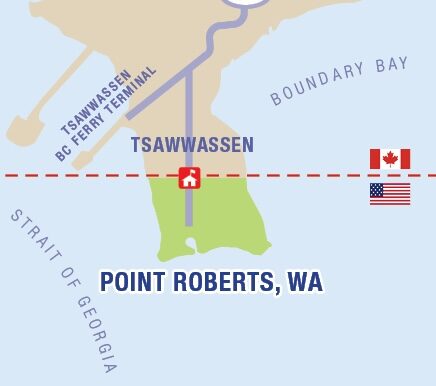
Bob Mackin
British Columbia’s NDP government wants to seize $13 million worth of properties from a company and its principals that the United States government temporarily branded a significant transnational criminal organization.
In B.C. Supreme Court filings on Feb. 14, the Director of Civil Forfeiture alleges that PacNet Services engaged in “unlawful predatory mail-fraud schemes, primarily targeting the elderly and vulnerable.” The court documents further charge PacNet processed millions of payments worth hundreds of millions of dollars from tens of thousands of victims.
None of the allegations has been proven in court and the defendants have not filed a response. A story last Nov. 22 in the Irish Times said the company laid-off 120 people, including 20 at its Shannon, Ireland office. “We were never involved in criminal activities,” PacNet executive Gerry Humphreys told the newspaper.

B.C. government wants to seize PacNet founder Rosanne Day’s Dunbar house (BC Assessment)
On Sept. 22, 2016, the Office of Foreign Assets Control blacklisted PacNet. Last August, it lifted the designation. PacNet was among several companies that received a full corporate tax break on international financial transactions, with the former BC Liberal government’s blessing. The new NDP government announced last October that it was eliminating the AdvantageBC scheme, which was run by ex-BC Liberal Finance Minister Colin Hansen.
The properties the government wants to seize and re-sell range from Boundary Bay beachfront to 10 acres on Keats Island and a waterfront house and boat dock on the Sunshine Coast.
The B.C. government applied Feb. 14 to freeze bank accounts and real estate, such as founder Rosanne Phyllis Day’s West 22nd Avenue home in Vancouver, worth more than $4.5 million, and a beachfront house on Centennial Parkway in Delta, worth $3.375 million. The Delta house is registered to the beneficiary of a trust that owns 30% of PacNet shares, James Ripplinger and his wife, Ivana.
The seizure application also lists a $1.94 million Keith Road house in West Vancouver that is registered to PacNet officer Ruth Hilda Rose Ferlow and her husband Peter Ferlow. It is, coincidentally, near a house in the name of Teresa Sharp, the wife of Frederick L. Sharp, who is under investigation for his involvement in companies related to the Mossack Fonseca law firm that were exposed in the Panama Papers leak.
The lawsuit says the Vancouver Police Department began investigating in October 2016, shortly after the U.S. action. The court filings allege that PacNet engaged in “unlawful predatory mail-fraud schemes, primarily targeting the elderly and vulnerable.”
The court application says that Det. Dwain Mah’s probe into fraudulent direct mail schemes targeting elderly and vulnerable Canadian residents found “since at least 1997, PacNet has provided cheque processing services for companies acting as fronts for individuals and organizations perpetrating mass-mailed fraudulent solicitations.”
PacNet was incorporated in 1994 by Rosanne Day at 595 Howe Street, two blocks south of the Robson Square Law Courts complex. It had been on the police radar for quite some time.
“For nearly two decades, PacNet has repeatedly been contacted by law enforcement and regulators in relation to civil and criminal fraud proceedings against its customers, and that PacNet has been notified on multiple occasions that its customers are engaged in fraudulent mass-mailings and in certain cases, PacNet has continued to facilitate the mail fraud despite this notice,” the court document said.
In 2011, VPD investigated a company involved with opening envelopes and removing payment called International Caging Services Ltd. Detectives learned that ICS routed all cheques, money orders and credit card payments from direct mail solicitations to PacNet for processing.
The court filing said it uncovered phoney direct mail prize schemes and Maria Duval schemes, “which falsely represent that a person has psychic or other supernatural powers and will use those abilities to improve a victim’s financial or emotional situation.”
“In both schemes, the solicitations appear to be personalized through the repeated use of a consumer’s name when, in reality, the consumer’s name was obtained from a commercially available mailing list. The recipients are generally asked to pay between $10 and $50 to obtain their prize or psychic service. The victims, who are often elderly, receiving nothing in return for their payment, other than an increased number of similar solicitations and/or a worthless trinket.”
The court filing says that Canada’s financial transactions watchdog was tipped-off by TD Canada Trust shortly after the U.S. government edict. Rosanne Day issued a $425,000 bank draft to husband Gordon Day from a TD Canada Trust account on Sept. 25, 2016. On Sept. 26, 2016, Gordon Day deposited the sum into a new Scotiabank account.
“TD Canada Trust considers this a suspicious transaction and accordingly filed a report with (FINTRAC).”
Support theBreaker.news for as low as $2 a month on Patreon. Find out how. Click here.
PacNet Application Feb142018 by BobMackin on Scribd











